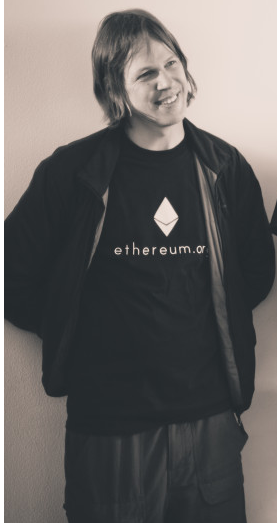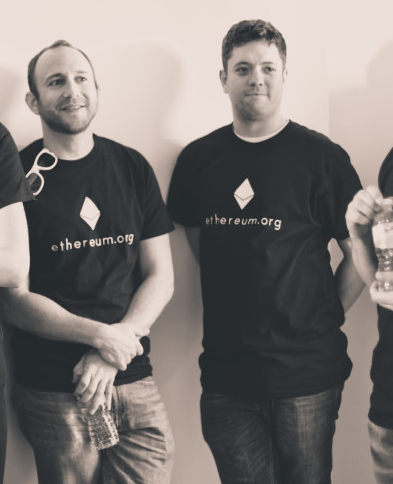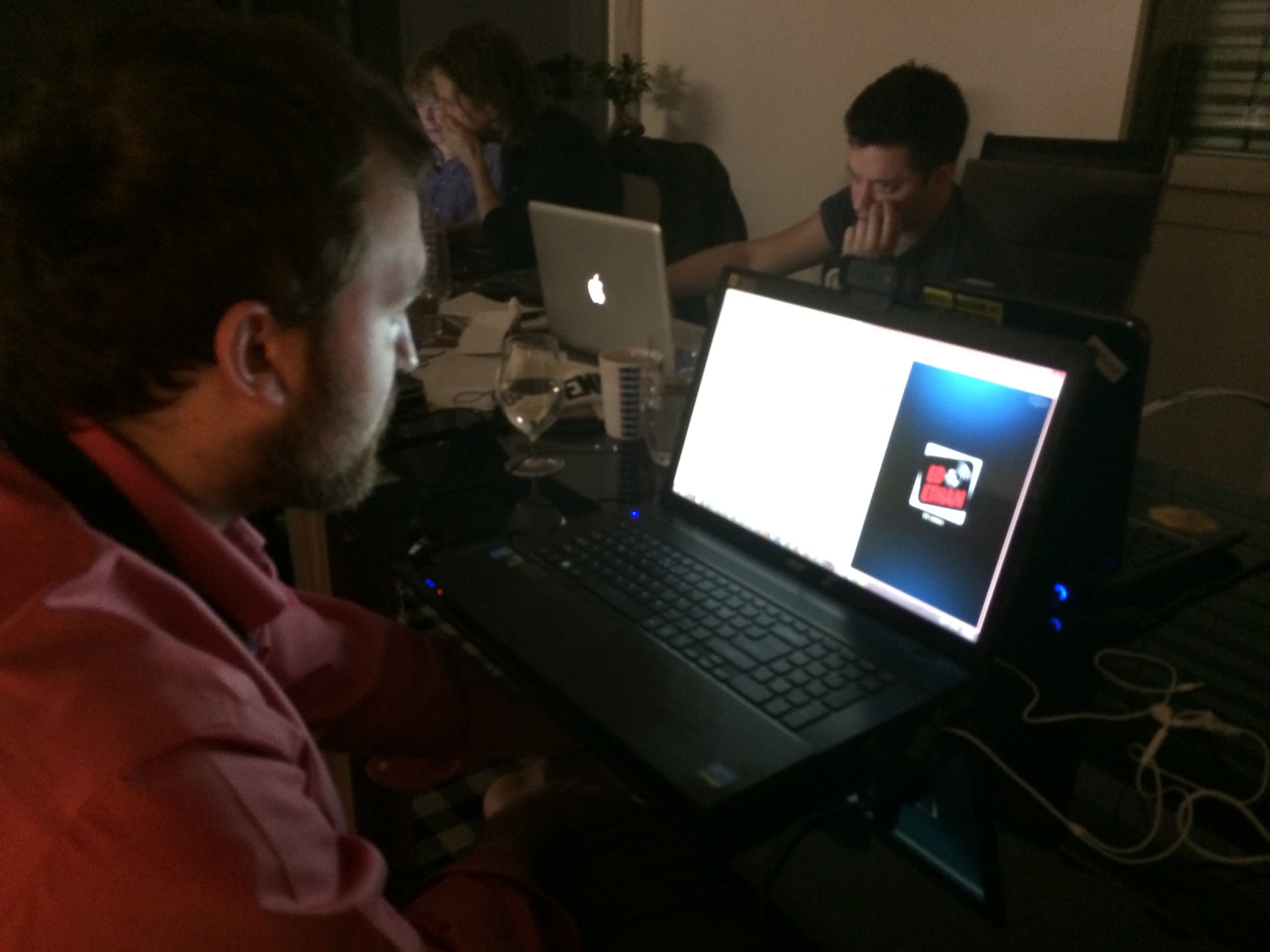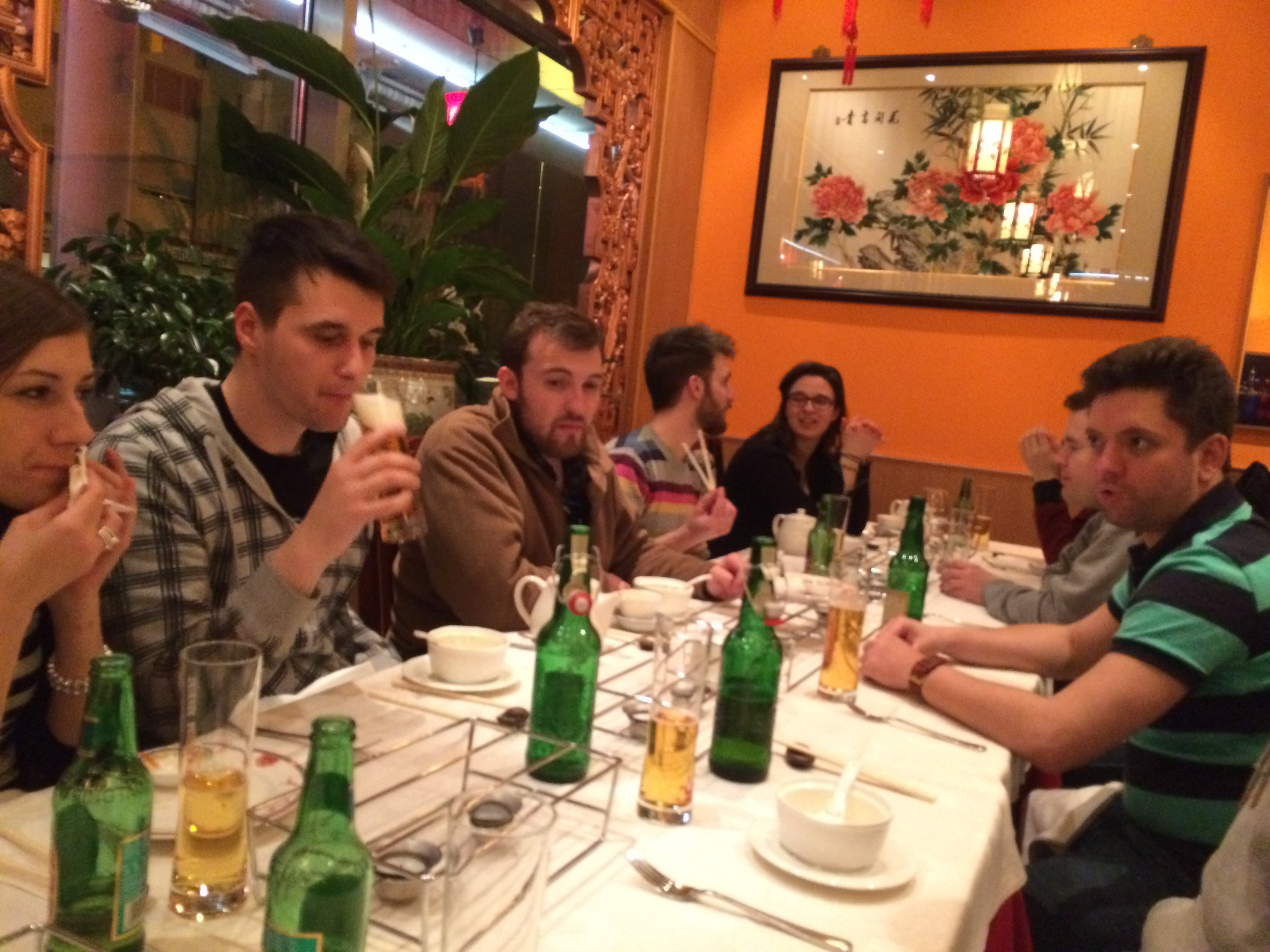early days of ethereum - episode 4 - taylor gerring
After a long hiatus since Episode 3 in November 2023, we returned with another episode of The Early Days of Ethereum.
Ethereum OG and "co Founder" Taylor Gerring joined us as a guest to talk about his experiences in the very early days of the Ethereum project, starting in December 2013.
Bob Summerwill hosted this episode with Kieren James-Lubin commenting a few times. Bob and Taylor overlapped at the Ethereum Foundation in 2016 and Taylor and Kieren's paths crossed in some of these early months of the project.
Contents
- Introduction and Taylor's background
- Discovery of Bitcoin and Ethereum
- Miami conference and meeting the team
- Early days in Zug, Switzerland
- Multi-client development and the yellow paper
- Vision for Ethereum and Web3
- DAOs and governance
- The Red Wedding and Foundation formation
- Ming Chan era and DEVCON1
Transcript
Introduction and Taylor's background
[3:09] Bob: Welcome everyone, so yeah, really happy to have Taylor Gerring here as a guest. Back in late 2023 Kieren, Victor and Jim did a couple of videos on the early days of Ethereum which I absolutely loved, being an Ethereum history buff as I am, and I made a whole load of notes on those sufficient that they invited me on as guest on the third edition so I made a bunch of notes on that again. So we were talking through our own experiences from 2014 onwards to around late 2017. But yeah, just thought especially with the 10th anniversary that it would be great to have an OG on to talk about the early days and you don't get a lot more OG than Taylor. So welcome, Taylor
[4:25] Taylor: Hello, everybody and thank you very much for that kind introduction Bob, and appreciate everybody. I'm honored to join you guys and maybe add a little bit to the story. Fill in some gaps in the history that people might be wondering and do whatever I can do to get some chuckles out of the audience!
[4:47] Bob: So, Taylor, do tell us something about yourself in general like where are you from, you know what what did your early years look like before you got involved in this nonsense?
[5:02] Taylor: Yeah, sure, so i'm actually sitting in the town I was born in, in South Florida, where I was raised and probably spent the first 20 years of my life or so, a few more than that. I knew already way back when that I was super good with computers and kind of entered college, university with the intention of like getting a degree in that realm. And that's what I did. I went to junior college first, and then I finished my degree up in Orlando. It was management of information systems, and the way I describe it is half business, half computers. And that turned out to be a fantastic skill set to kind of bring to the early days of Ethereum.
You know, when it's just startup mode, things are just flying left, right, up, down, forward, every single direction. and there's not a lot of people paying attention to kind of how the business is supposed to work and be organized. I thought that gave me a little bit of a leg up going in, understanding that we're going to have to submit receipts for things and they're going to have to be accounted for. And so I was a little more diligent with my early days activities because of that experience.
But, yeah, I left there to go to Chicago and got a lot of great experience in the companies and organizations I worked with up until the point where, honestly, I got tired of working with proprietary software, you know, from predominantly Microsoft houses. And I sort of moved shifting back towards open source software, kind of thinking back to when I first got started. I was doing like PHP MySQL. And it found me at the right place, right time to discover and learn about Bitcoin and really fall into the whole world of open source, decentralized, cryptocurrency, blockchain software. So I just feel like I was an opportunity and luck meeting. I was prepared for the right thing. I was in the right time, right place kind of situation and try to stay positioned there. And that way I could bring all my skill sets to a project that I was very passionate about.
[7:21] Bob: I mean, were you like a libertarian, a cypherpunk, a gold bug, a prepper, any of that kind of flavor?
[7:34] Taylor: You know, honestly, I kind of had a little bit of a heads up about politics and the whole left versus right thing and trying to step away from that. But I had not really gotten into the super libertarian stuff. I wasn't really a precious metal guy. It was really once I discovered Bitcoin and really understood it and those principles that we all kind of take to heart once we finally joined the cult. That really stumbling upon Bitcoin is when I most embraced those kind of ideals, if you will, and certainly hold a lot of those still close to me today, even though it feels like as a whole industry or whatever, we're kind of out of practice. A lot of people just don't really think about the decentralization side, but that is definitely part of what drew me in was the idea that wasn't controlled and that we all are contributing. And even some more esoteric ideas like living in Holons, like alternative communities and stuff. I'm fascinated by all that stuff. I recognize there's some practical limitations with modern society on making that work.
Discovery of Bitcoin and Ethereum
[8:50] Bob: Yeah, yeah. So, I mean, how long were you a Bitcoiner before you heard about Ethereum?
[8:55] Taylor: I discovered Bitcoin, I want to say in 2011, when I was clearing off a laptop, I saw I had the Bitcoin software downloaded, but it was still in testnet mode. I never figured out how to get out of testnet mode until when I really discovered the second time in 2012 and going into 2013. Then I continued working through 2013, doing some mining, trying to join various aspects of Bitcoin projects, writing about different alternative projects like Namecoin, BitMessage and stuff. And then I guess it would have been towards the end of that year was when I met Mihai Alisie in Milan, Italy. I think that was late 2013 and then Vitalik ended up giving his talk in Miami to announce Ethereum officially in 2014. So I guess maybe it was just over a year that I was like a pretty diehard Bitcoiner.
And then just feeling like there's more to this whole blockchain technology and observing what everybody was trying to do with alternative things. Like I said, Namecoin was one of those, like using blockchains for name resolution services. I saw the writing on the wall that there was something else to do with Bitcoin, and I just didn't know what it was until I finally read Vitalik's paper three times and, you know, it kind of clicked in my head that, ah, here's the way forward.
[10:39] Bob: And you were working for some wallet company or involved with a wallet project when you were in Miami, yeah?
[10:46] Taylor: Yeah, yeah. So I think at the time I wrote in on the Bitcoin dev mailing list about like trying to figure out can we do a slider, like just normal UI slider that we use all the time for volume and whatever to adjust the fees and stuff for Bitcoin. And that was at the behest of Wendell Davis who ran a software company making Hive Bitcoin wallet and it was supposed to be something super secure simple enough for like your parents to use.
I think I had like Tor network built in by default and he had taken interest in some of the projects I was working on on top of Bitcoin. So probably most people don't know but the first project i wrote if you go on github there's a project called pay through paythru and the idea was can I pay bitcoin to people who haven't necessarily set up a bitcoin address yet so for example tipping on twitter, tipping somebody's website things of that nature and so I kind of came up with a little system where it would generate a address to send the funds to if that person didn't have something pre-registered.
And I had a mechanism in place where the person then, for example, put their Bitcoin address in their Twitter link, handle, profile, whatever. It could go scan that and it would pull that address out of there and then take the funds from the temporary address and pull them over the more permanent one. So it was kind of like a way to hold the funds. And then if you had an account and you're like, oh, I want to collect my tips, all I got to do is like put my own Bitcoin address on my website or on my Twitter profile. And then you could receive those funds without having to really do very much.
I thought it was kind of an ingenious system. Some people didn't like it because of the technicalities of how Bitcoin has addresses and return addresses are not always return addresses. But I think it was novel and interesting enough that Wendell saw the value that I could bring and my skill set to Hive Bitcoin wallet and so I started working on that kind of on the I guess, it was like a very rudimentary dApp sort of interface. The wallet could have like plug-in sort of things where you could click on click on the the dapp sort of thing and because you're loading it in your own wallet it already knows what your receiving address is um so it made it easy to like go to a website and interact with various services with knowing already some of your crypto information. So i started working on like plugins and things of that nature making them refined.
But once I learned about Ethereum, I found it really, really hard to want to keep working on the Mac-only wallet, because I just saw the impact of working on something that wasn't just focused on one platform. Wendell was very instrumental in informing, encouraging me, I guess is a better word, to go out and travel a little bit more and just be a nomad living out of my backpack. And it was because of that that I ended up going to Milan and meeting Mihai. And Mihai is the one who ended up connecting me to Vitalik and the rest of the team. So Wendell is definitely an instrumental part of my story with Ethereum.
[14:37] Bob: Nice. Yeah, he's a bit of a mystery man, isn't he?
[14:40] Taylor: Last I heard, he was in Thailand, I think with a wife. I don't know if he was having kids or whatever, but he kind of fell off the face of the earth to me. I haven't heard from him in many, many years.
[14:54] Bob: No. He was at DEVCON1 doing a talk about Grants actually and I got my name on the screen. I didn't get to go to London but I was on the screen as a named contributor to EthEmbedded. But yeah, I didn't see him around in Ethereum that much, much beyond that kind of timeline.
%}
[15:16] Taylor: There's a lot of that, though. A lot of people have, you know, they put in their contribution and they go attend to other aspects of life, right? Life isn't just working about, working on startups. I mean, some people want to have families and stuff. So, you know, there's a lot of people who have done their thing and gone off to greener pastures, whatever that means for them. And no hard feelings to any of those. I mean, I find myself in a similar space where I'm not contributing like I once was and trying to enjoy other facets of life. but I think it's just part of the natural cycle of things.
[15:52] Bob: Yeah, yeah, for sure. I mean, like I was saying on that Twitter thread last night, I think a crazy project I could do at some point would be trying to talk to and interview all of these early contributors, you know, 80 or 100 people. Many forgotten to the mists of time and many of those have probably never been really asked about their story or their experience.
[16:15] Taylor: Yeah and kind of to your point, it would be great to capture that because especially with 10 years in the past I know not all these memories are being perfectly remembered. You know our brains are kind of faulty and it'd be nice to get some of it down in video or or books or whatever just to capture all that for future posterity
[16:37] Bob: Yeah, yeah, for sure. So I mean, you mentioned Miami there, so Bitcoin Miami was late January 2014 and very early February where Vitalik had his sort of announcing Ethereum first presentation at a conference and then that was where I guess many of you got together to meet each other physically for the first time after a month or two of interactions. How was that?
Miami conference and meeting the team
[17:10] Taylor: A little nerve-wracking for a shy computer nerd to just meet up with a bunch of randos. And I was kind of there with Wendell and his group. And then he had told us about these other people that rented a house. I don't think any of us had sorted rooms or figured out where we're staying, and it was kind of like just turning into a crash space. So, like, I didn't know hardly anybody. I was keeping to myself a lot. But it did turn out to be a very important time and place to be in the historical story of Ethereum. There were the vast majority of, I'd say, like some of the earliest people that had huge influences on Ethereum's eventual launch. A lot of those people got together physically for the first time there. I believe Jeff Wilcke was not able to go, but a lot of the other Europeans came over stateside for that. And that was the first time that I met and sat down with Vitalik, and we started working on some of the very basic ideas of what the website crowdsale sort of situation would need be, although that all eventually changed.
One thing I like to point out is that conference there's some photos some of which I took and some of which others took but the way the story goes is that room was standing room only he was in to give the announcement of Ethereum and then afterwards the questions kept coming in and kept coming in and the organizers had to ask him to step outside and I just remember these photos of like him being mobbed by a group of people just wanting to ask them questions. I think Joe Lubin was standing right there. Probably Anthony Di Iorio was probably real close. But that's a very iconic picture in my mind, at least.
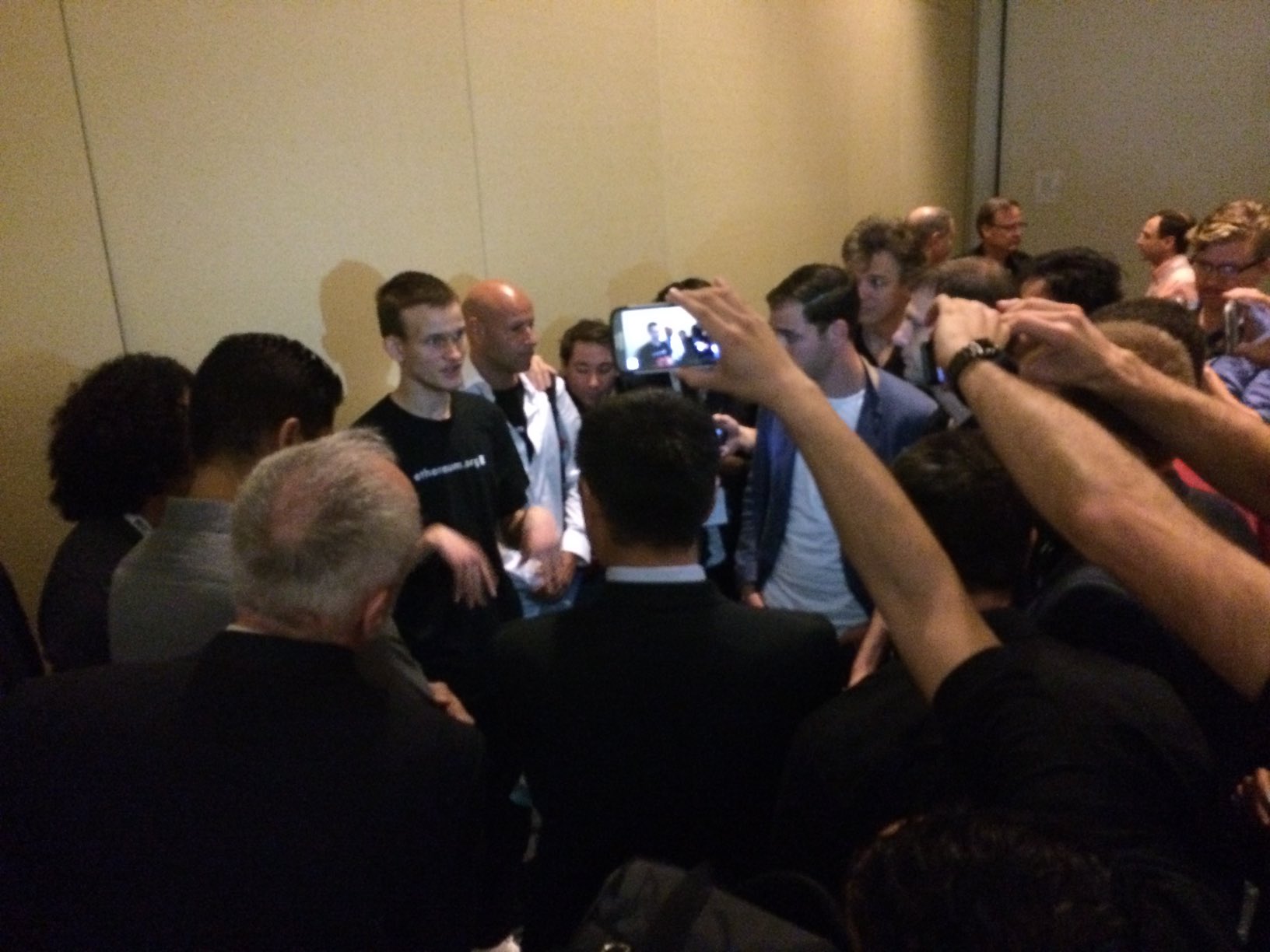
But anyway, the house that Anthony Di Iorio had organized became kind of the hub and the central place where we all gathered around. I think Jonathan Monaghan? Mohan?
Bob: Mohan, yeah.
Taylor: He was doing some recording stuff there. I remember Charles Hoskinson being there out on the back patio with Joe and Vitalik. I was in my photography era, so I was doing more photo taking. But I didn't know where to sleep, and I had brought a hammock down with me. And so I ended up sleeping in the backyard on a hammock between two trees, looking out over the canal that ran past the house for two nights.

[19:57] Bob: Nice. Yeah. Same with that iconic photograph. I can't remember the guy's name now, but at some point I met the guy who had the speaking slot after Vitalik. And he said "… and everyone just sodded off!" It's like nobody left in the room for him.
[20:15] Taylor: That's got to be a tough act to follow, you know.
[20:20] Bob" Yeah. So, yeah, saying about a great number of photos from January, March through July of 2014. If you look on my Twitter thread from yesterday, I linked to some of those.
(Since this interview, Bob has started gathering all of Taylor's photos from 2014 into a new page on this site. Original Twitter posts are JAN-FEB 2014, MAR 2014 and APR-JUL 2014)
[20:50] Taylor: It was a really interesting time I don't think anybody really knew what was going on I just felt like documenting as much as I could while I was there was like the way to do it because everybody was just living in the moment
[21:13] Kieren: I think Bob's audio was glitching for a little bit and now he's muted again can everyone hear me?
[21:20] Bob: Oh I'm back. I was just saying on that thread on the photo thread that you got, Taylor, that was that sort of iconic everyone crowding around Vitalik yeah with Anthony and Joe there and then some photos on you on the back patio. Then there's that group shot with everyone there and some other bits and pieces.
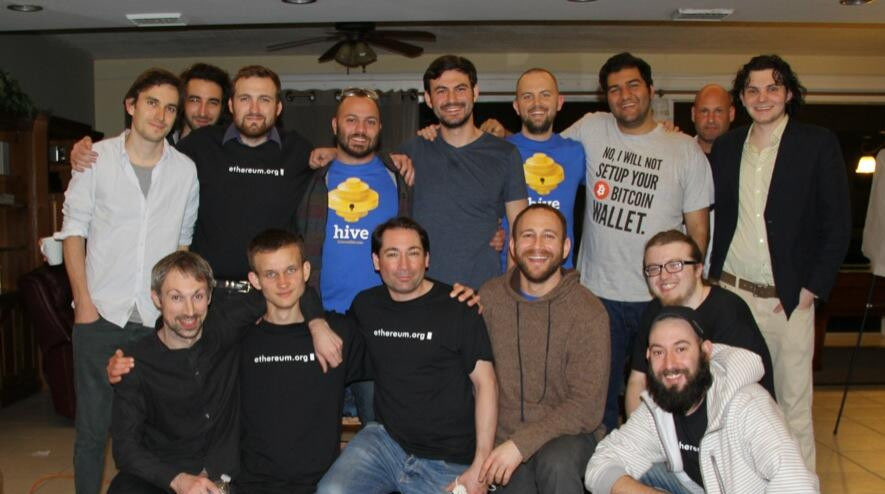
(The Ethereum team in their Miami house rented by Anthony Di Iorio for the 2014 Bitcoin conference. Top (left to right): Dino Mark, Yanislav Malahov, Charles Hoskinson, Antony D'Onofrio, Steve Dakh, Wendell Davis, Jonathan Mohan, Joseph Lubin, [REDACTED]. Bottom (left to right): Gavin Wood, Vitalik Buterin, Anthony Di Iorio, Taylor Gerring, Jason Colby, Kyle Kurbegovich)
[22:03] Bob: So yeah it's saying February the 9th was the day that we arrived in Europe so that's where the Zug adventure began?
[22:06] Taylor: Yeah, it would be interesting to go back and check the actual timeline. I felt like things happened kind of fast. Where we landed in Zug was, I mean, we landed in Zurich, but then we took the train to a small farm town called Meierskoppel. And there was a handful group there that was just staying on Airbnb. And I went along with my friend Nick Fierro, who kind of came with me. We met up in, I think, Germany somewhere and continued on to Zurich. But we landed there, and it was just very chaotic in the sense that nobody had a good sense of what was happening, on what timeline, for what reason, you know, whether it was just sleeping quarters or getting the website online or who was arriving.
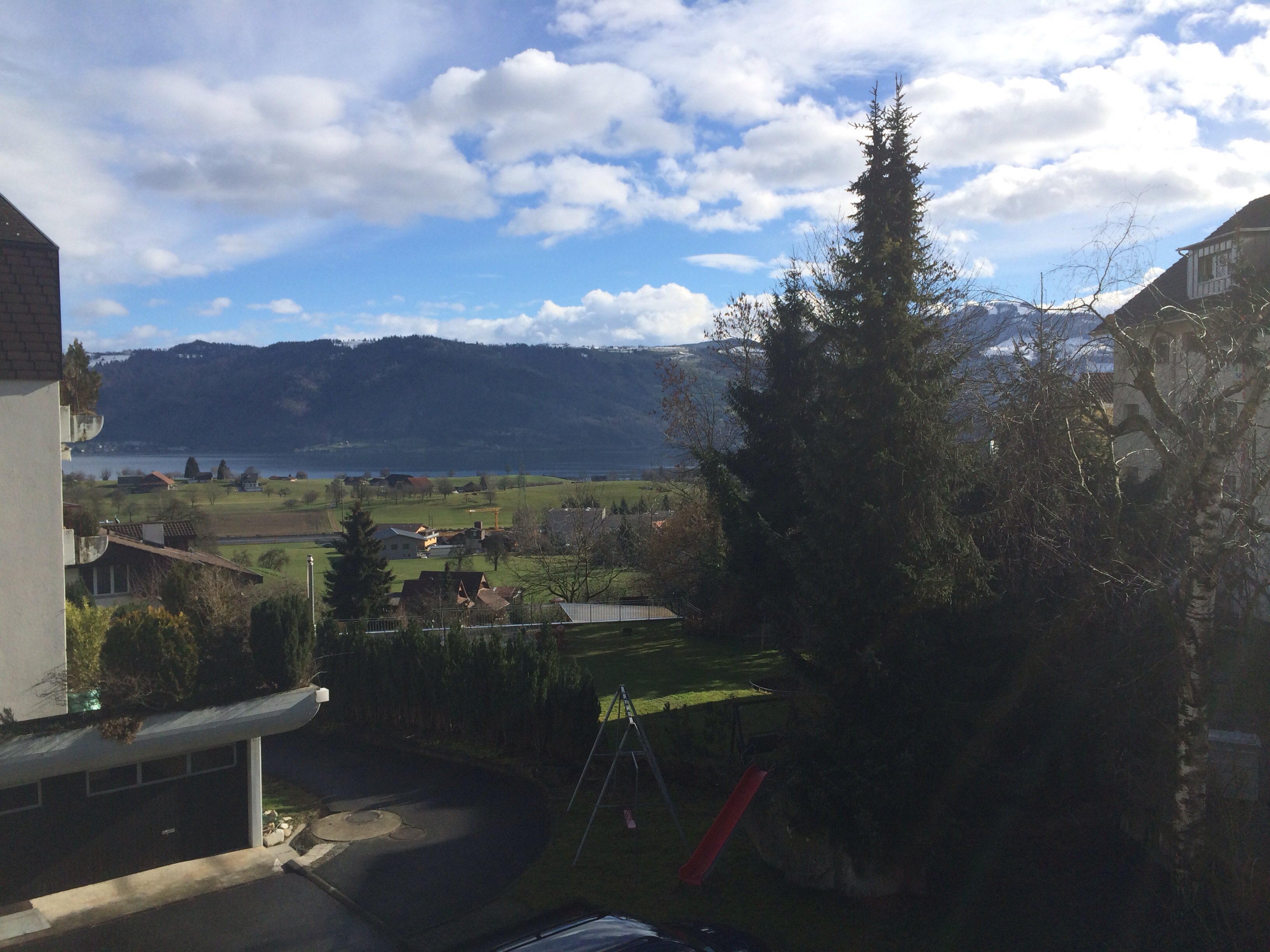
It was just constant chaos. But if I remember correctly, Charles came in the next day or two pretty soon thereafter. And then the house eventually filled up with [REDACTED], who did all the artwork. And oh, gosh, I can't remember his buddy.
Bob: Richard Wild?
Taylor: Richard Wild. That's right. [REDACTED] was actually the first one who was introduced to the project. He brought [REDACTED] along. And I think [REDACTED] ended up sticking around longer.
[23:29] Bob: Yeah. Though he wasn't originally called Richard Wild. Funny little tidbit. That's actually his wife's surname that he took when they got married. I forget her name, though.
[23:39] Taylor: Really?
[23:40] Bob: Yep. I guess he liked Richard Wild. It sounded cool.
[23:46] Taylor: I just assumed it was a pseudonymous name that he had picked and changed or something like that.
[23:52] Bob: It could have been. But yeah, I believe he had a different name before than her name. [REDACTED]. [REDACTED]. Perhaps it was a pseudonym for them both?
Taylor: Who knows?
[24:19] Bob: I mean, at that point, were other people, like, working together in other parts of the world? Have you got people together in, you know, in London or New York as well at that point?
[24:21] Taylor: Unbeknownst to me, I thought Zug in Switzerland was kind of ground zero. And I think from a legal standpoint, that was probably true. But certainly from a code standpoint, it was not the case. And that, you know, led to some schisms down the road of like. The funny thing is like Game of Thrones was premiering every Sunday while like Ethereum's developing. And Switzerland was just like, turned out to be one of the hubs, right? There was also Berlin and London and Amsterdam and Toronto, arguably. And so it was like, took a little bit of time, but it started to become apparent there was definitely a Game of Thrones being played in many different ways. I think we were all very naive in the earliest of days.
But as we're trying to get money to get into a permanent house like what was called The Spaceship I started to feel some of the struggles and pains of like hey there's a bunch of other groups and everybody's vying for resources at this time. Then you start to get to deal with some of the other personalities.
One of the things I one of the fun stories I remember is dealing with the Germans and having to accept that, you know, Germans just talk in a certain way and it's not meant as like an offense. It's just how they speak and you have to kind of just roll with that a little more terse, if you will. But being introduced to everybody around the world and having to work with everybody and get those different personalities to mesh culturally or otherwise that that was a very interesting process we were pretty good i feel like in in the local hub and everybody that you saw on the daily but it was like interesting when you started to get those other groups worked in and and try to like you know.
Thinking about setting up a server for Gavin. We were crammed in a tiny little apartment and he wanted something set up and i didn't do it fast enough and i definitely heard a little bit from him and i probably could have been faster but i didn't realize he was kind of just waiting on the other end for me. So yeah it was it was just very interesting. I was in my own little bubble with the Switzerland crew but then uh gosh it was probably only a few weeks before we got moved up and out into a larger house and and things became much more complicated much more quickly.
Early days in Zug, Switzerland
[27:00] Bob: Yeah, just looking down through your photos it says February the 9th is when you arrived in Europe and then February the 13th is when Stefan "arrived at our tiny Airbnb" and then there was something on the 22nd. Oh yeah [REDACTED] and [REDACTED] arrive on February the 22nd at the Airbnb (Edit - I misspoke, this was actually Feb 20th)
[27:38] Taylor: So I guess that was a couple few weeks of there before [REDACTED] and [REDACTED] arrived.
[27:43] Bob: Right. Then I'm just looking in March, the March photos. "Charles bought dinner for 10 people on March 1st". Watching Fight Club.
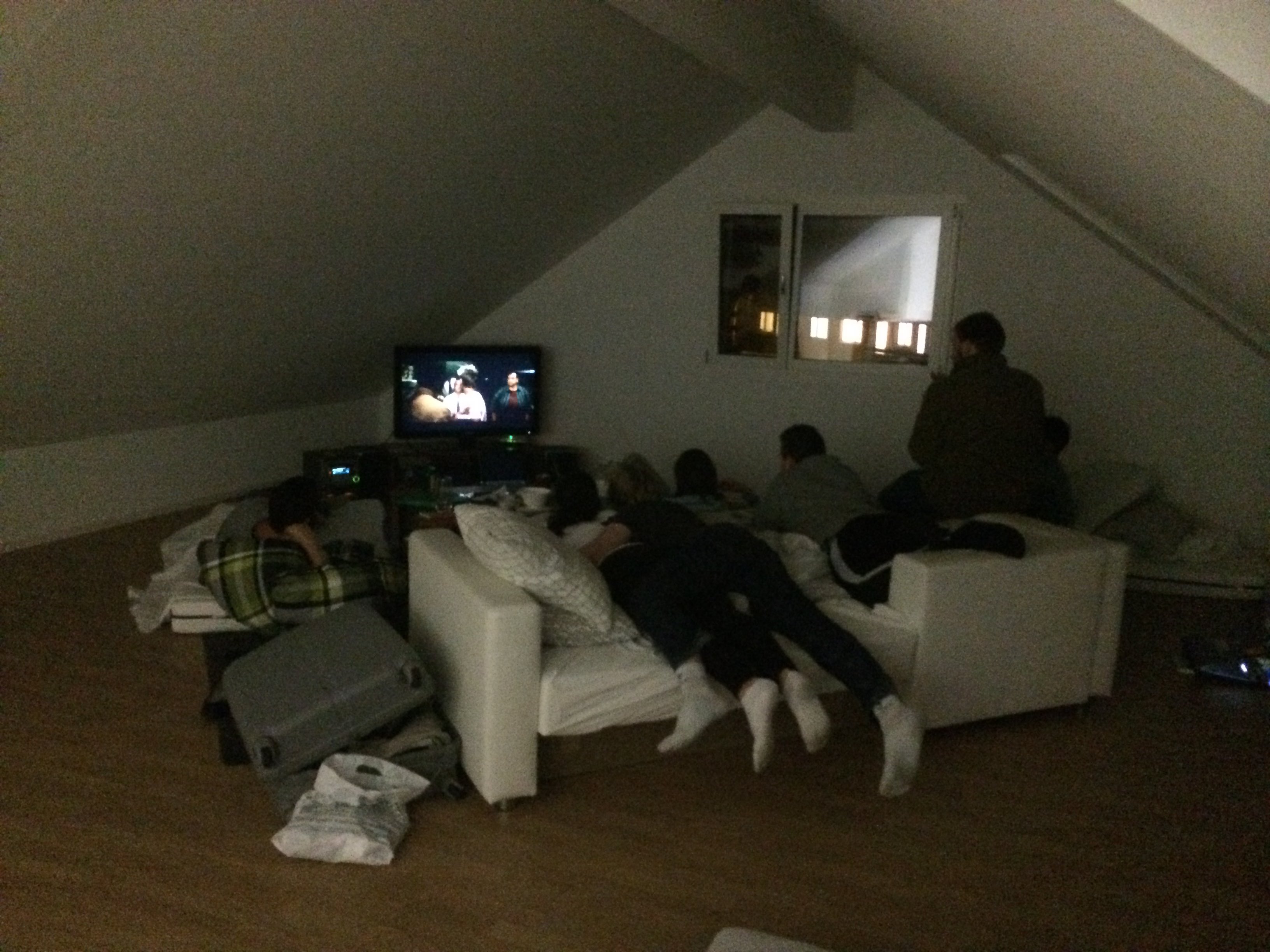
[27:58] Taylor: You know, like looking back, And one thing that kind of stands out to me is it was definitely like a ragtag team of people there and trying to figure out what we were doing. Like this became a constant like wedge in the group is like what our contribution was, right, from a code perspective. And I was responsible for the website stuff. So I think to our credit, getting the team kind of motivated up and going to go from we just met and within a couple of few weeks here, we started spinning prototypes of the website and working together in our different capacities to kind of get this machine in motion and prepared for what would eventually become the crowd sale. It was like kind of no small task, I guess, just having to learn how to get together and figure out your skills and know how you're going to plug into the rest of the global organization.
But, yeah, there's there's, I think from February 12th, so just a few days after I landed, we kind of were up and moving on the Web site (Internet Archive snapshot from 8th Feb). And that was constantly a moving target, too. Once we got additional legal guidance and getting everybody's photos right in the right order and the right titles underneath, and that became a huge headache. And that wasn't even like the actual functioning app that took in Bitcoin and assigned like your key out. This was just months before in the run up to that. Just these personalities jiving, if you will.

[29:34] Bob: I believe that at the Miami time or shortly afterwards it was announced that the crowdsale would happen within a month or two months, it was like a really super short timeline that was thought at that point but then yeah, I guess all of that got delayed both with technical and more importantly legal concerns.
(As per Cryptopians, the crowdsale was slated for 1st February 2024, almost immediately after the Miami conference. That was delayed on 26th January 2014, as soon as the conference ended)
[29:59] Taylor: Yeah getting kind of our legal footing where we as a team felt comfortable proceeding. And it wasn't just like one or two guys, right? You have to get, you know, 8, 10, 12 leaders going in the right same direction and get them to agree when they want vastly different things. But, yeah, it was like I think way back then the whole joke was two weeks, right? two weeks, two weeks, two weeks. Everything was two weeks away. And two weeks eventually turns into months and months. Because the crowdsale wasn't until what, June, July?
Bob: I think July or September (Edit - it was actually July and August)
[30:39] Kieren: And it ran for like 49 days or something like that. So I was like in New York for the later part of this time. And it was funny to have the sort of stiff attorneys come by what was then our Times Square office, which I was there with Joe and Jonathan Mohan and Steven Nerayoff (now infamous). And, yeah, I think there was always this, like, global communication going on. And, like, on the one hand, I think everyone was massaging the stiff law firm into, you know, what the parameters needed to be and the opinion letter and so on and so forth. And, you know, I think from a capability perspective, technically, that was probably running faster. Although we were not – I think Joe spent a ton of time on, like, the terms of service and the docs and did a lot of the support during the crowd sale.
But, yeah, it was like the app was being developed. Who built the app that generated the wallets? I'm forgetting his name. Maybe he went from work.
Taylor: The Romanian guy? Marius?
Kieren: Damn, that might be right. He might have gone in. Did he go to work at ConsenSys afterwards? I think that might have been the case, but I could be misremembering.
(Edit - his name is actually Marian Oancea and he is listed on the People page)
Taylor: Because he wrote the EthStats app, I thought.
Kieren: I think that's right, too. Yeah. EthStats app. I forgot about that.
[32:13] Taylor: (Laughs) There's a lot of facts from the early days that it's like I don't know some of it's what we were thinking and some of it's like I missed that
[32:31] Kieren: I mean there was quite a lot of coordination overhead and I wasn't really in the center of it but it was very visible so I … Go ahead, Bob.
[32:40] Bob: So I mean were Vitalik, Gav and Jeff in Zug during those months or was it just like at that early bit you know in like February or so or were they not even there?
[32:55] Taylor: I don't remember Gavin and Jeff coming to visit Zug until after some time. Primarily in the earliest days I remember Vitalik coming there and then once Zug became kind of like the legal home we started doing more and more meetings in person there. These board meetings, things that needed to happen face-to-face. I don't think either of them were super keen on it. Gav loved Berlin, and Jeff had a lot of family ties and whatnot to Amsterdam, so he didn't like to leave overnight if he could help it. He might come for a day trip. But in the beginning, beginning days, Vitalik would come and stay for a while, and that was kind of nice, honestly.
[33:41] Bob: Yeah, because, I mean, what was happening during those months was the parallel development of three different clients, right? You've got Pyethapp that Vitalik was working on. You've got Geth that Jeff was leading and then Gav building cpp-ethereum and stacking out the yellow paper. I mean, Jesus, Gav did so much work in those three months. Like, absolutely insane to get to the yellow paper so fast from there. So, yeah, I can imagine it was just heads down and did not really want to talk to, have people, chewing his time up.
Multi-client development and the yellow paper
[34:20] Taylor: It felt like having Vitalik doing coding in Switzerland gave us a better balance because when Vitalik visited Berlin or Amsterdam, it felt like the code went in the direction of wherever two of the three main developers were.
Bob: Yeah.
Taylor: And, you know, for better or worse, people realized that they could, if they could bend Vitalik's ear, he had a difficult time saying no. And that means they could kind of set the agenda and direction of whatever they were trying to push, if you will. It was unfortunate that it was like way back then it was that easy to sway. But I think that's something Vitalik probably learned certainly by the time he launched the project. He was becoming more aware of how people would use him in that way. But in the end, it all worked out. We all had the three different clients that were interoperable. To your point, the amount of work that had to go into the yellow paper to take everybody's discussion and codify it into something that was, even if imperfect, close enough for the clients to be developed totally siloed from each other. I still remark that as one of the best things that was accomplished, whoever's goal that was, probably Gav's. But famously, I think Bitcoin defined the implementation as the spec. And from a technical perspective, Ethereum had an actual spec and that you could derive any implementation you wanted from it. And that's something that the purest technology guy inside of me really appreciates.
Bob: Yeah, no, I mean, I think it's it was pretty magnificent, to be honest. And from what I can see, it was it was a direct reaction to what happened in Bitcoin, where Satoshi had basically, you know, had this immaculate birth. And then you could never really get to alternative implementations like even now. Really, like, it's never really nothing's ever really stuck. But also, I think just the act of having that discipline of defining the spec and having multiple implementations, you know, that lets you triangulate between the different clients and say, oh, is there an ambiguity in the spec? So the spec there's a bug in the spec or is it a bug in a client and then that's really had this sort of like division of powers kind of thing right that you haven't had a single group in a single code base everything is stuck with that. You've had that kind of balance and yeah I mean for the Haskell client for STRATO itself you know really benefited from that you know I mean Kieren can maybe say something about how that happened, that, you know, you could just order a new client?
Kieren: So I think this is also, yes, one of the great things about Ethereum was that it was always a really big tent. It was very open, in a way too open, to Taylor's point, right? You know, but I think on balance, the attitude was right. And, you know, I think later projects have been run much more like companies. But Ethereum, especially early on, felt like kind of amorphous open source builder collective, if you will.
And so the spec was documented. And so I met our CTO, Jim, I'm going to say September 2014. Yes, September 2014 or thereabouts. And we started talking about it. And maybe unbeknownst to me, after our first discussion, he started implementing the Haskell version of Ethereum to the point that it could sync. It didn't have all of the features in it. And I started coding on it, I don't know, January 2015 or maybe a little bit earlier than that. We would definitely find, you know, we'd like wake up one morning, it was syncing the night before, you'd pull the latest and like some big module was added, like, you know, dev B2P. It's like, oh, it takes an encryption now to, you know, connect and be able to sync the network. It didn't before and such like that. So, you know, I think there was definitely kind of like layers of access and consultation in terms of how the protocol evolved and so on. But it was cool. There were tests. We were like you'd run the VM tests and the results were provided. And, you know, we would be – our CTO mostly would report on the percentage which passed, which would, you know, start at 80 or 90 percent and then go up to 97. And then something would change and we'd go down to 90 again. And, you know, eventually we made it all work in the end.
So it's a really hard thing to do. I mean, other industries certainly, like, the aim, of course, is to have Ethereum be a protocol like HTTP or any other. And I think this was achieved, or at least largely achieved. It was top, you know. And just the communications between the teams were not mature, I would say. Definitely kind of like whoever got to Vitalik last, again, to Taylor's point, but also sort of an insider-outsider feeling was going on, despite the openness of the project. Almost a strange contradiction in terms. But all in all, it's been a great run.
[40:24] Taylor: Yeah, I think if there's anything to learn from having been involved in Ethereum by any stretch of the imagination in the early days is that despite the fact that we were all working on this, you know, quote unquote, fairness protocol, it didn't take away from the fact that it was like real human beings with real problems that still had to write the software. and it was a really big growing up time for me emotionally to understand that everybody's differing needs.
[41:02] Bob: Something I observed a few years later was you've got to be very atypical to even be involved this early on, right? Getting involved in this stuff is not something that like a normie is going to do. You know, hey, there's this thing, it may or may not work, might be illegal, but, you know, off we go, give it a go. So I think, you know, intrinsically, you know, these frontier folk prospector types, we're all a bit weird. So, yeah, you get a bunch of those together, you're going to get a lot of friction and misunderstanding. And maybe a lot of people not great communication or emotional skills either.
[41:52] Taylor: Yeah, from that perspective, it was probably a special time and place that enabled us to kind of pull together as we did. I mean, if it weren't for Bitcoin meetups and people normalizing sort of getting together with this sort of stuff, even though to your point, you've kind of got to have a decent case of the autism to even be interested in throwing your life at this. I don't know that it could be recreated, just getting that kind of group of people together that had the skills and were able to put together at least enough social skills to make it all work.
[42:33] Bob: Yeah, no, I mean, I think it's, yeah, a very sort of exceptional situation and event. and maybe you could say what do you think might come out of Ethereum what do you think could be built what were your thoughts on how this might pan out in an ideal sense?
Vision for Ethereum and Web3
[42:56] Taylor: Ethereum generally? Is that what you're asking? How Ethereum would pan out?
[43:02] Bob: Yeah, I mean what do you think Ethereum was going to be? What did you think these efforts could lead to?
[43:14] Taylor: I think I understood in the earliest days that there were a lot of other possibilities. Certainly 10 years down the road, we've explored a lot and found out some of them are more possible than others. I was also a large proponent of what Gavin was very into, which was like the three tent poles of decentralization. It was like storage and messaging and compute, I think, and that's something that I was very excited by. I think going back and looking at some of my early writings for Bitcoin Magazine on some other like online publications I had already been investigating different protocols built around bitcoin and so I think I was most excited by this idea of like rebuilding.
I mean it's kind of what we joke we call Web3 but I think it had a more concrete idea way back when which was like Web2 but decentralized. Something that wasn't controlled and owned by the corporations or had more like anonymous abilities so that we could continue to communicate online without having to worry about like a real ID or anything like this. So I think it was a lot closer to the Cypherpunk ideal of like maintaining free and open access of the internet for everybody, was kind of the core tenets that I felt most passionate about with respect to Ethereum, far more so than building prediction markets or like a CryptoKitties. Not that those things aren't interesting but that was'nt necessarily my focus. My focus was on how do we maintain an open Internet in light of the fact that we have corporations and governments that would like to apply censorship and control over it
[45:10] Bob: Yeah. Yeah. So, I mean, those three sub protocols were Ethereum, you know, so your decentralized compute. Swarm. So Swarm is your decentralized storage with incentives layer on top of it. And then Whisper was the decentralized messaging. So Whisper kind of died. It didn't really work. It turns out there's a successor to that called Waku, which Status have been developing for a good amount of time. Swarm is still going, but has ended up being very little used. IPFS really seemed to win there. Apart from it hadn't got the incentive layer, which is what Filecoin is trying to build on top of that. I think it's sort of like, with all of these things you could do with decentralized anything, right? That you could have your smart contracts executing your logic that decentralized storage could store like your web content, you know, that you have a hosted front end that was all kind of within that kind of system, you know, like a BitTorrent-y kind of thing, but with incentives and then that messaging there. So yeah, that was really exciting to me as well because it's like, oh, here's like a computer. Here's a platform and you can do all of the things that you could do with a Web2, but in a completely unstoppable way with built-in payments and you can build whatever incentive mechanism you like. Texture talked about it like a social operating system. A societal operating system.
[47:00] Taylor: Do you or Kieren or anybody else up here, does anyone feel that Ethereum didn't accomplish what it set out to accomplish in light of the fact that we really just shipped the compute layer? Do we miss the mark in any way?
[47:21] Kieren: You know, it's a great question. I think the answer is no, just in the sense that you put something out there and you don't really know how people are going to use it. The world computer was a really compelling vision. And to your point, it didn't shake out exactly that way, right? It doesn't feel like a complete computer, it feels like an economy and is only doing certain parts of the economy. But I think that's totally okay, right? Like, just getting anything that changes how the world functions done is so important. And honestly, one probably needs to specialize in general from there. And probably, you know, what you see after Ethereum is yet more specialization. You know, projects are way more narrowly tailored on average than Ethereum as a whole. So maybe it's just there was, like, too much to chew and, like, a little bit impossible, you know, in a way.
Yeah. And there's there's, you know, I mean, actually, I just don't hear that much about IPFS lately. Like it doesn't feel like the demand for censor proof everything on the Internet is that strong right now. Something would have to happen for there to be really big uptake and need again? People have to your point kind of forgotten that part. And it may happen again. I mean, like the we see pretty strong speech controls coming out of the EU, especially as regards the Internet. So we might see another wave. But even the the attempts that sort of a crypto native social have all been about financialization versus uncensorability, the ones that have caught on to some degree. And financialization is also just really important, you know. but yeah so I guess I'm saying so maybe it's you know it's not the complete original vision but it's not his fault it's sort of like where the demand went in my opinion.
[49:38] Taylor: What about do you either you guys this wasn't a part of my original question but I'm looking at the photos here and I don't know in one case I kind of feel like the area that Ethereum failed a little bit was the whole DAOification of various aspects. Ethereum itself never really became a DAO. We tried The DAO and that had famously a bug that we had to have like a white hat hacker group help recover funds from. And then a lot of DAOs get set up today, which are essentially just money funnels. I don't know, maybe it was too out there of an idea, maybe not concrete enough for anything to be considered and reconciled as a DAO, but the whole turning things into a DAO just never seemed to transpire, even though it was technically possible with just a compute layer.
DAOs and governance
[50:30] Kieren: You know, and I'll throw it over to Bob in a second, but I think it didn't happen. I agree. And I know both of you were kind of heavily involved with the Foundation, which could have pushed that along harder or been sort of a legal brick-and-mortar host for the DAO as opposed to whatever it is and was. And we've seen a couple kind of work. It seems like the DeFi DAOs are okay, and they may be a little bit centralized in decision-making and so on, but they actually seem to serve a purpose, and sometimes they're kind of, like, intimately involved in the protocols. I think of, like, the Aave DAO or the Uniswap DAO, et cetera. So, like, people have been able to achieve it, and it's on Ethereum, right? And so, like, why didn't Ethereum itself achieve it? Also, I mean, there's things that could be done that aren't. Like, we could take stake-weighted votes on things, for instance. And I think it's never really been done other than staking itself. And I don't know why. Like, I think maybe later entrants sort of had to do it from a transparency perspective. But, you know, the will, I think it's a will thing more than anything. You know, everyone, one, it's like a really intense effort just to keep the network up and so on. And then it got really big and you didn't want to change it, kind of et cetera, et cetera. So, yeah, I agree it didn't happen. And I think it could have happened and I don't know. You know, there's definitely a gap there. And I don't really know the why.
I want to also put in, before I end to Bob, we should, before we let Taylor go, talk a little bit about the "Red Wedding". But I'll throw it to Bob on this question.
[52:34] Bob: Yeah, for sure. So, I mean, just on the, you know, on that Web3 vision, you know, the other legs not landing, I think the one that has been like a painful failing is to do with web front ends, you know, that many, many applications, though they may have, you know, smart contract back ends, even without admin fees, you know, just code is law, smart contracts, they're often still going through a conventional web front end and that's you know that's a junction point a failure point often legally like that's happened a lot on privacy or mixing things is people get like done for hosting the front end even if the smart contracts are immutable and out there so that's been one problem area.
I think part of that though is nobody wants to run servers. I think this was something that I had a quite different thought on at the beginning. It's like, yeah, we can run decentralized everything, right? And it's all unstoppable and perfect. But the fact is, nobody wants to run servers for anything, let alone something that's really heavyweight. And I think that was kind of the vision. Say you have Mist, right? You can run a browser and it's going to have the node in the back end that it's going to pull the things from Swarm and perfectlyly decentralized on this.
But, you know, that stuff just, I think, was quite naive because the cost and overhead of running a node is really quite high, let alone if you want to get the throughput that you'd need for sort of worldwide trade. So, yeah, we've ended up with a lot less throughput and a lot less people running their own stuff. And that's all the complexities of L2s. So, yeah, I think that's not quite a thing, but I don't know how you saw that.
[54:30] Taylor: I hold Apple partially responsible for making such good laptops that everybody started switching over to laptops. I think way back then, a lot more people had desktops. The idea of having idle storage and compute just sitting there was a greater thing. But now that a lot of people, myself included, don't even really bust out the laptop. I live on my phone, work on my phone, and there's no good way to support the network as a server client on the phone. So to some degree, it feels like the mobilification of all of our devices is to blame for some of those original ideas not panning out as we had hoped.
[55:11] Bob: Yeah, I'd agree. I mean, the first thing I was doing on Ethereum was doing ARM Linux cross builds to get a client running on smartphones, smartwatch, Raspberry Pi and all of that. And I had the real naive view at that point. It's like, all right, yeah, just got it working. And, you know, there'll be some like client thing. And, you know, you can just do everything, right. And this will just be like a background task or, hey, you know, we're defining this protocol. And like Ethereum will just be a protocol that will just be in operating systems it will just be part of the Linux you know part of the Linux distro you know you just write yeah you've got Ethereum running in the background and you know off you go and that absoultely didn't take off in the way that it was originally envisioned I don't think.
And the DAO question I think maybe it's as simple as that people don't care about lots of things, right? It's kind of like having a job, having to participate in a DAO. You have to try and understand what's going on. Like, you know, I think that's a human scaling thing, right? It was a sort of a, we don't like hierarchy kind of naivety. You know, like hierarchies are a scaling mechanism. They help us solve large scale problems by breaking things up. I think having hierarchies that you can never change and be powerless within is a terrible thing, but hierarchies per se, I think are very useful.
[56:51] Kieren: A DAO is sort of like a condo association, right?
[56:55] Bob: Very, right. Who wants to go and be involved in that?
[57:01] Kieren: Only one tyrant, you know.
[57:04] Bob: That's right. So, yeah, talking about the "Red Wedding" or really just really the birth of the Ethereum Foundation, right? Because you were a director on that at the start of the Ethereum Foundation. So how did all that, like, resolve into what came out of that in the form of the…
The Red Wedding and Foundation formation
[57:29] Taylor: Yeah, so I had the dates clicked away on my timeline. But the best way that I remembered the story was there was unease cropping up with Charles, who seemed to have kind of lost the trust of the people that he claimed to want to be leading. And Amir Chetrit, who a lot of people, myself or included, were kind of asking what contribution is this guy giving other than just being given a title of founder? Because he was supposed to be responsible for all the stuff that I was actually doing, and he wasn't really involved, like wasn't somebody I reported up to in any way. and I think those kind of those conversations came to a head when he was wearing swag of a different organization in Toronto when we had that Bitcoin Expo 2014 and I ended up in the basement of the office there on the phone with like a Cloudflare type company to provide DDoS protection and I'm just like I don't understand why I'm on the phone having the big boy meeting and Amir, who's supposed to be doing this, is not.
So I think just kind of the frustrations rose and it got to a point where some hard decisions had to be made because the organization definitely was not moving forward. Charles, I think on his part, was a little bit more on the let's set this up like Google, and make it a corporation, and I was definitely more on the side of open source and making it available to everybody. So I don't know what kind of, like, weight that had in Vitalik's head when he was making his decisions, but it felt like, to me, in hindsight, it felt like a huge exhale after that whole incident happened.
I feel like looking at the photos, you see pictures of, like, how much money we think we're going to get, what we think we're going to do with those funds. We started imagining up these DAO sort of ideas, really started moving forward on a lot of things where it felt like we were kind of locked within the grasp of each other trying to duke it out on who was going to win politically inside the org.
I remember the day being very, very uncomfortable. Everybody had come to Zug. There were girlfriends and partners there in addition to just the people involved with Ethereum. And it was just very uncomfortable for a very long time. It was an emotionally exhausting day.
And I think I have a picture of being on the back patio where we kind of all crammed in while Vitalik was just, like, on the front patio walking around trying to make his decision. And it was entirely up to him at that point. So who knows what would have happened if he had made the decision any other way. I like to think that by choosing to put Stephan and myself in place in leadership positions and asking Amir and Charles to move on to other things, I feel like we had the team in place to actually get Ethereum delivered. And maybe it would have gotten delivered anyway, but I don't know. I feel like making that change when that happened is what ultimately enabled us to ship Ethereum in a relatively on-time way and doing what we all promised it would do.
[1:01:23] Bob: So just to ask a little beyond that, so when that decision had been made, so the Ethereum Foundation was that legal entity set up in Switzerland and you were one of three directors at that point?
[1:01:39] Taylor: Yeah, at first it was just Vitalik, Mihai, and myself were the three people. Part of that was because we were the only three people physically present in Switzerland at the time. Everybody else was remoted in. And it just made things a lot more concrete to be signing a wet pen on a tree, the people who were physically located inside the municipality. I served in that position for, I don't know, probably a few months, a handful of months before, you know, just truth be told, no shade at Gavin. We buried the hatchet as far as I'm aware. But, you know, Gavin was pushing very, very hard to not have Mihai and myself be involved on the board. And he eventually won that battle of attrition.
We ended up signing some docs on a train one time to resign our positions from the board. And to the best of my knowledge the board never been faithfully repopulated. There been a couple of times where some other people have been brought onto the board but I don think the board ever really been truly flushed out in that way. Maybe that doesn't matter now, but the three of us were the first ones that actually created the entity, and that served as kind of the goalpost that we were aiming for and the legal restrictions we were going to abide by.
Switzerland was treating us really, really well up until that point and they offered us some very favorable incentives to continue our progress there and I think that's worked out well for them. They've become like a crypto valley in a way. The cottage industry's popped up around it. So I think it all worked out in the end.
Ming Chan era and DEVCON1
[1:03:28] Bob: So yeah. So, not to go on too much longer, but the next phase was the phase of Ming. So, Ming arrived in 2015, right?
[1:03:46] Taylor: Ming arrived. She cleared out some of the cruft, which I think was very necessary. A lot of people still had ties with the organization but weren't as actively involved. To a degree, myself included with that. My role kept changing with the org. First, it was scaling the initial website. Then it was the crowdsale. Then I started helping on doing not QA work, but unit testing work on the go-ethereum clients. So doing some coding there, writing the first complete RPC implementation was my responsibility, least some of the terrible namings of the functions. You can definitely blame me for those. Then eventually kind of like traveling around the world and speaking in places that Vitalik was too busy for or didn't desire to go to, I would kind of go do those talks. So my role had kept shifting and I wasn't the only one that maybe some of the positions that were valuable in the earliest of days were no longer as valuable and she kind of had to come and clean house a little bit. And, you know, to her credit, she did what she needed to do at that time.
[1:05:06] Bob: Yeah, I mean, there was a lot of spending, wasn't there? I mean, I ended up joining the EF in January, February 2016, which was maybe about seven months after she'd joined, really as a consequence of the C++ team being cut, you know, and then because I think at that point there only like four months of runway left at one point there, with the spending rate there was and ETH price has not even really taken off since the crown sale. So it was, you know, that was actually when Whisper and Swarm both got their budgets cut entirely at that point, along with the C++ team, getting rid of the spaceship and various other bits and pieces.
So, yeah, maybe just one last piece then is, later there in 2015, you had DEVCON1, which was the very first public conference there in London, which nearly didn't happen because of that running out of money. And my understanding is really that Joe and Andrew of ConsenSys really funded that. So what are your memories of that first conference? How was it to have a big public conference and people interested and some big companies represented as well?
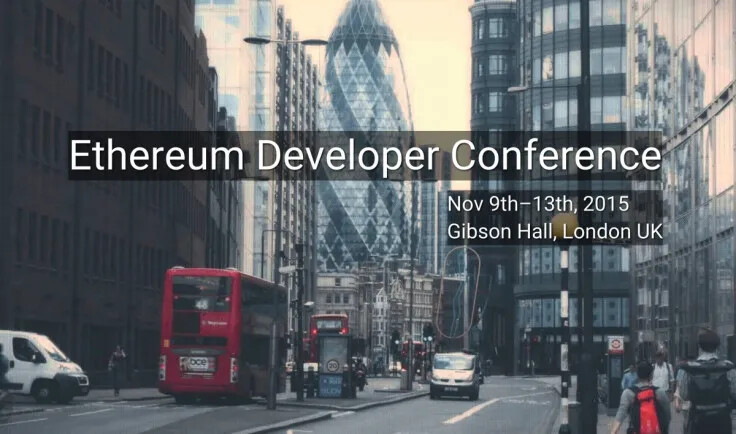
[1:06:37] Taylor: Yeah. Your recollection is the same as mine in the sense that ConsenSys definitely carried the weight of that conference in terms of financial and organizational. From my standpoint I remember being so thrilled to have an event that was like all our own we had been crashing you know quote unquote crashing Bitcoin sort of parties which we were feeling less and less welcome to. Bitcoin Expo 2014 it was like we had a booth there but there was a lot of not concern, not criticism, but like just people were not entirely sure of what we had going on.
DEVCON0 being like an in-house kind of private only event, this was the first time that it felt like showing off a little bit.
(Edit - DEVCON0 was held on November 24-28, 2014, in the newly renovated Berlin offices of Ethereum ÐΞV UG, in the Kreuzberg borough of Berlin. The street address was 37a Waldemarstraße, Berlin 10999)
Taylor: We had interest from, I think Microsoft was involved as a sponsor. Fun little fact I had come up with the colored Ethereum logo with Microsoft colors and that ended up being adopted and being used as like a de facto logo for that conference.
Kieren: That thing was everywhere I didn't know you did that it was all over the place.
Taylor: Yeah I think I had done that in like something really basic just for like a blog post or something like that but it was really cool to have that.
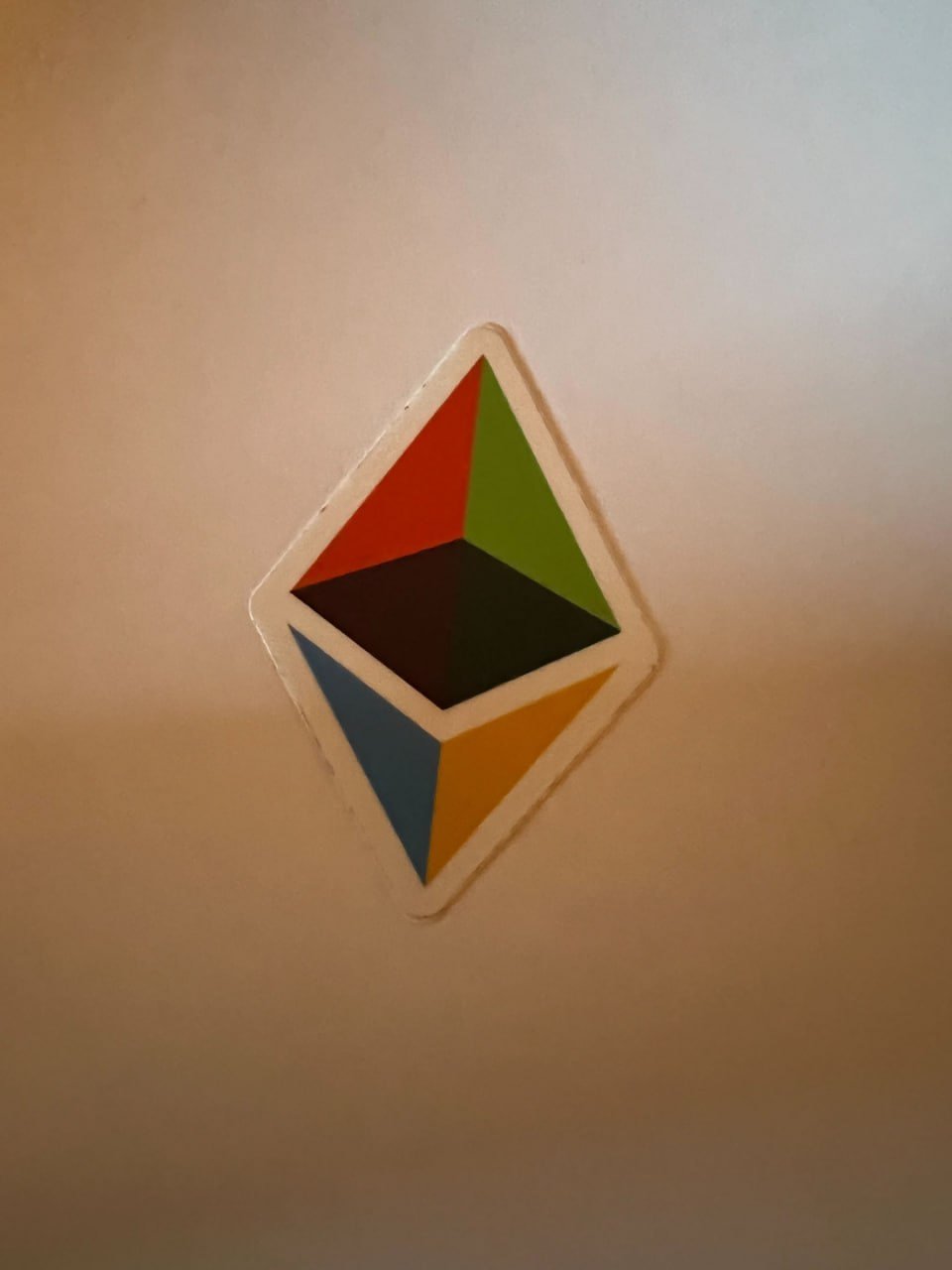
(Edit - Victor Wong later found that he still had an original sticker of that DEVCON1 logo!)
Taylor: And then we had the big Bitcoiner guy, I can't remember his name off the top of my head.
Bob: Nick Szabo
Taylor: Yeah what was the last name?
Bob: Nick Szabo
Taylor: Yes, yes, Nick Szabo. Yes he was there as well and I felt very excited about like feeling like we had support from both sides of uh old school bitcoiners, even if he was paid to be there or whatever and also um like interest from the corporate side of like Microsoft like that felt like we had finally made it in, in a way of acceptance even though the the number on the coin wasn't high at the time it was like wow there's literally a room full of people here not just like techie teams but people in business development and other facets that were interested in what was going on in this community space and it felt like acceptance, I guess, is the best way to guess, best way that I can say I felt. It was a special time, for sure.
[1:09:28] Bob: So, yeah, I mean, Nick Szabo, famously the inventor of smart contracts or the term smart contract. So, yeah.
[1:09:40] Kieren: I have to interject. it felt like during his presentation he strongly implied he invented Bitcoin like he almost put it on the screen you know, like 2003 is the time frame or something he didn't come out and say it but it was funny
[1:10:04] Bob: Yeah I'm trying to remember what year it was it was like oh 1994 smart contracts were was termed. Quite a while back. OK, I think that's maybe a good point to leave it, unless Kieren and Taylor would like to talk a little bit about football.
[1:10:33] Taylor: I only talk about golf these days.
[1:10:37] Kieren: I think we can close it there and our incredibly appreciative of Taylor coming on. Actually, from the audience also on fairly short notice. Thank you and a happy 10 years to Ethereum. Hopefully, you come back, there's lots more story. Thanks, Bob, for leading us through it.
[1:11:04] Bob: Okay. Thanks so much, Taylor. Thanks, everyone, for coming. have a great week all the best
Taylor: Thank you everybody.
